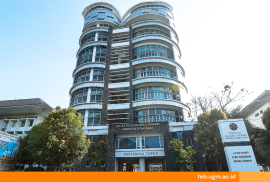By the theme “Fight Against Poverty and Corruption”, Student Executive Board of Faculty of Economics and Business (BEM FEB), Universitas Gadjah Mada held a variety of activities to participate on prevention
against corruption in Indonesia. One form of them is “Corruption-Free Economy” Workshop with the big theme “Corruption-Free Economy Towards Prosperous Indonesia: Revealing Institutional Corruption through Economics and Business Perspective.”
Workshop took place on Saturday (16/10) at Auditorium MM UGM with keynote speakers: Prof. Dr. H. Amien Rais, talked about: “Corruption Hegemony that Affect the Nation”, Chief of KPK Bibit Samad Riyanto, presents:”Data and Facts corruption that infected the Nation”, and President Director of Pertamina, Ir. Karen Galaila Karen Agustiawan that discuss: “The Impact of Corruption in SOE Operations.” Also,economic observers, Rimawan Pradiptyo, Ph.D. fill his session by discussing “Dark Veil Corruption Affected State Owned Enterprise” Former Head of fiscal policy section, Indonesian Finance Ministry and now professor of FEB Universitas Gadjah Mada, Anggito Abimanyu, Ph.D. explains about ” Bureaucratic Reforms as a way to built Anti-Corruption Characters.”
In addition, the exposure is also presented results from Anti-Corruption Study Center Universitas Gadjah Mada (PuKAT) research titled “The Role of Ethics and Transparency in Creating Anti-Corruption Institution” also a presentation from Hanta Yuda AR, SIP, an Indonesian Institute researcher titled “Ideal Nation Without Corruption, Creating Generation of Anti-Corrupt.”
At his session that talk about “Modelling Three Pillars Combating Money Laundering and Corruption in Indonesia”, Rimawan Pradiptyo stated that Indonesian Anti-Corruption Act has several weaknesses that must be critized. Anti-corruption law currently covers only corruption at public sector and doesn’t cover corruption at private sector. Moreover, Anti-Corruption Law does not cover after-corruption activity (money laundering) that actually difficult to be separated from the corruption itself. “This law does not reach a wider corruption issues, like money politics on House of Representatives elections, presidential election, legislative election, Bribery Act and Banking Law,” he said.
Another weakness, he said, the law didn’t pay attention to the rationality perpetrators/potential perpetrators of corruption. Inclusion of the maximum penalty would stimulate players/potential players to do the calculation of the level of corruption that is profitable. With the inclusion of maximum penalties in the Act to make the deterrent effect weakened over time, inflation in Indonesia is very high. “The higher the inflation, the lower the deterrent effect of fines. This makes the need for amendments to this Act more urgent,” he explained.
Sumber: www.ugm.ac.id




